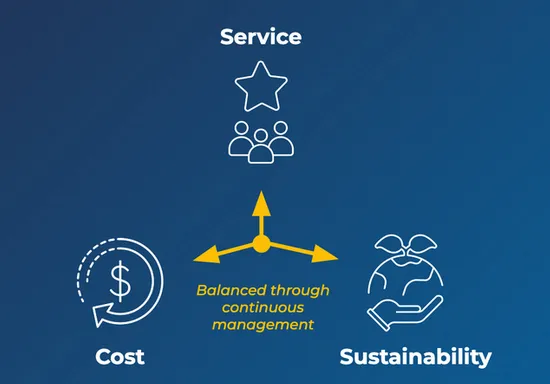Key points
- Sustainability currently faces political skepticism but most companies are maintaining or accelerating efforts despite potential regulatory rollbacks
- Stricter emissions standards, like the EU’s ETS1 and IMO’s carbon tax for shipping, and ETS2 for road, are driving investments in cleaner fuels
- Business leaders increasingly link sustainability to value, with supply chain resilience and localization as key strategies
- Ignoring sustainability risks regulatory penalties, reputational damage, and missed opportunities, making it essential for long-term succes
In some specific contexts, “sustainability” is becoming a dirty word. Should supply chain professionals join the slowdown? Not so fast…
Take the most obvious context: US President Donald Trump recently told the UN General Assembly that climate change is the “greatest con job ever perpetuated.” As TIME also reminds us, he has already dismantled the State Department office behind climate negotiations, has confirmed his country’s retreat from the Paris climate accord, and has named a head of the Environmental Protection Agency (EPA) whose track record is the opposite of environmental protection.
But it’s not just the USA. The CSRD, probably the world’s most far-reaching environmental reporting directive, currently risks being considerably watered down by European lawmakers. Previously obligatory for companies with over 250 employees, that bar should be raised to 1000; ‘should’ being the operative word, as April’s “omnibus” directive effectively stopped the clock on CSRD’s rollout throughout Europe. Countries now have until the end of this year to transpose the directive into national law.
Are companies slacking off, though? Not necessarily: only 13% of companies have retreated from sustainability, according to a Harvard study of 75 global firms, “while 85% have held steady or accelerated efforts - often under the radar.”
So what does this mean for supply chain professionals? According to Searoutes’ VP Customer Success Paul Canessa, CSCOs are already “almost fed up with answering the [sustainability slowdown] question!” Because for our sector, pressure to be more sustainable is mounting, not decreasing.
Regulatory pressure - rising
We recently learned that the 7th planetary boundary - ocean acidification - has just been breached, partially due to the effects of fossil fuels. So it's fitting that environmental rules for shipping in particular are currently stepping up a gear.
Firstly, the EU’s ETS1 (its first Emissions Trading System) - which has already lowered industry and electricity production emissions by 47% since 2005 - will see 100% of air and ocean emissions taxed from next year, up from this year’s 75%, and 40% in 2024.
As explained previously, Fuel EU Maritime, another of the EU’s initiatives to lower emissions by 55% by 2030 (vs. 1990), has already demanded that by 2024, fossil fuels only represent 20% of boats’ total fuels. This, says Canessa, is why more and more ocean carriers are investing in boats powered by fossil fuel alternatives; they are taking a cost hit today in order to avoid their vessels becoming a “risk zone” tomorrow. “Investing in boats powered by cleaner fuels is effectively derisking, as you usually keep vessels for 15-20 years,” he adds. In other words, environmentally-unfriendly boats could become a liability in the near future.
Beyond Europe, the international carbon tax finalized last spring by the International Maritime Organization is set to be formally adopted in October, before enforcement in 2027. The tax will be mandatory for all ships with over 5,000 gross tonnage, as these vessels emit 85% of shipping’s total emissions. As the IMO puts it, under the draft regulations, ships will be required to comply with:
- Global fuel standard: Ships must reduce, over time, their annual greenhouse gas fuel intensity (GFI) – that is, how much GHG is emitted for each unit of energy used. This is calculated using a well-to-wake approach
- Global economic measure: Ships emitting above GFI thresholds will have to acquire remedial units to balance its deficit emissions, while those using zero or near-zero GHG technologies will be eligible for financial rewards.
Finally, not one to be left out, the UK will introduce its own carbon market for shipping, in 2026.
As for road transportation, although ETS2 doesn’t come into effect until 2027, as previously reported, shippers need to start getting prepared now, because contracts with carriers generally cover 1-2 years. This means that if you call upon too many carriers who themselves haven’t anticipated ETS2 by using cleaner fuels, you could in turn incur extra charges. It’s also down to shippers to raise awareness of this topic with their own carriers, and encourage them to make more sustainable choices now, in time for 2027.
Business pressure - ever present
All of the above factors, plus many more besides, add up to increased business pressures for supply chain players. Quite simply, as Canessa puts it, “ignoring sustainability runs an increasing risk of missing out on business. All shippers today expect a company like DHL to be able to give them the emissions data of their expeditions.”
Indeed, similarly to Harvard’s study, a recent survey of global CEOs by Bain & Company confirms that business leaders are increasingly linking sustainability to business value. 54% of CEO statements (e.g. in media, podcasts etc) connected the two notions in 2024, versus 34% in 2018. This report in particular digs deeper into the role of supply chains, emphasizing that:
- Supply chain localization is a high-return strategy for sustainability.
- Collaboration between innovation, marketing, supply chain, and sustainability teams is essential to drive environmentally friendly decisions.
- Resilient strategies—such as redundancy, modularity, and decentralization—are critical as supply chain disruptions rise.
- Climate change’s impact on transportation cannot be ignored, with trade routes, infrastructure, and sourcing strategies already affected.
Climate change is currently “straining global trade routes, degrading infrastructure, and forcing companies to rethink sourcing strategies”, add Bain & Company, whose report cites as further examples the fact that critical minerals are often concentrated in climate-vulnerable regions; and the way loads have had to be reduced in the logistically critical Rhine and Danube rivers, due to droughts.
In short, faced with ongoing global heating, resilient and antifragile supply chains have never been more essential.
These reasons and more are why CEOs today are increasingly leaning on tactics such as automation, supplier diversification or flexible manufacturing capabilities to develop deeper resilience, according to Bain & Company's research:

The bottom line: Sustainability is non-negotiable
It’s clear that ignoring sustainability won’t make the problem go away. On the contrary, companies that fail to integrate it into their supply chain decisions risk missing out on business opportunities.

CSCOs are already used to managing crucial data relating to cost, and to service level/OTIF, two vital pillars of global supply chain management. From now on, they have to manage a third pillar: sustainability.
The good news: an increasing number of services exist to help supply chain professionals make trade-offs between these three crucial factors. For example, they might choose a slightly more expensive carrier because it has a good track record for sustainability and reliability.
The right tools combined with high-quality data, and potentially aided by (sustainable) AI, could effectively enable such high-level decision-making. ShipAngel, for example, leans on AI to help shippers choose the most sustainable and cost-effective routes. And of course, visibility solutions such as Shippeo's AI-powered ETAs and scope 3emissions measurements can also help CSCOs improve overall efficiency and make the right trade-offs.
The less good news: it’s now evident that failing to meet these priorities simultaneously isn’t just a business risk - it’s a regulatory and reputational one too.
Staying committed to sustainability isn’t just good for the planet - it’s essential for long-term business success.
Latest blogs & product releases.
Authors
Frequently Asked Questions
What is the current state of sustainability efforts in global supply chains?
Despite political skepticism, most companies are currently maintaining or accelerating their sustainability initiatives.
How are new regulations impacting shipping and road transportation?
The EU’s ETS1, Fuel EU Maritime, and the IMO’s carbon tax are tightening emissions standards, pushing ships to adopt cleaner fuels and technologies. ETS2, for road, is expected to have similar effects from 2027.
Why is sustainability becoming a business imperative?
CEOs increasingly see sustainability as linked to business value, with supply chain resilience and localization emerging as high-return strategies.
What tools are available to help supply chain professionals balance sustainability, cost, and efficiency?
AI-driven solutions like ShipAngel help shippers choose the most sustainable and cost-effective routes, ensuring compliance and competitiveness. And of course, visibility solutions such as Shippeo's AI-powered ETAs can also help CSCOs improve overall efficiency and make the right trade-offs.







